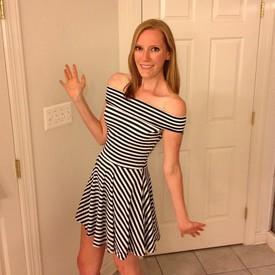To count calories or to not count calories?
Options
Replies
-
Yeah, I never noticed. The reason I use this site is because it seems to be one of the most popular weight loss sites and there are other features on this site. I still know people that didn't count calories but still managed. What I'm asking if using the counting calorie feature is absolutely necessary.
No if you think you can successfully lose weight and keep it off without counting calories, but if your loss stalls, how will you determine what to change? Reasons can vary from too few calories, too many calories, high sodium, etc. It's a tool that is put before us to use and it's free so why not learn and figure out what works for you? By the time I hit maintenance, I will likely still be counting calories as it has become a habit for me and has kept me on track for the most part. Why negate the benefits of something that has worked for so many?0 -
Sounds like you need to figure this one out for yourself. Try not counting & just eat healthy. If you lose weight, it works for you. If it doesn't, then you probably need to count.
For me? I need to count.0 -
You do need to be in a calorie deficit to lose weight. How you go about creating that deficit and tracking that deficit is up to you.
^ this.
If you cannot log regularly/consistently then I guess that if you weighed yourself regularly and looked at your overall trend you would soon figure out if you are eating in a deficit or not & then you could adjust your diet accordingly but it would be a lot more accurate just to log your food in the first place and track your intake. If logging is really not something you want to do forever, you could always relax your logging once you have been weighing/measuring food for a while and are more confident in assessing portions by eye.
When you workout, calories are subtracted from your daily goal. Do you have to maintain eating at that calorie goal? Because for some reason it feels like when I burn 300 calories when I work out and eat 300 or more to maintain the daily calorie goal, it feels like I'm maintaining, not losing. Can someone tell me how this works? I know eating too less calories is really bad, but I want to lose, not maintain.0 -
According to my reseached, people who log the food they eat, are more successful in weight loss. It personally keeps me accountable. However, I could see how people can get obsessive with counting their calorie intake. It's not for everyone. Good luck!0
-
I recommend counting calories, at least for 30 days or so. That way, you get a good handle on the serving sizes and calorie information for foods that you commonly eat (as long as it's a normal month- not going on a 30 day vacation or something). Then, theoretically, you could eyeball things with some accuracy.
I like calorie counting and weighing my food because there is no doubt. I also know that, when I'm trying to lose weight, I actually tend to undereat by overestimating my calories. Then, because I'm so hungry, I fail to maintain my weight loss.
I am a vegetarian. I don't eat from the vending machine. I don't eat cake or ice cream or donuts or pizza. I might have a serving or 2 of chips once a month. And yet, I gained this weight. Just eating 'healthy' isn't enough for me.0 -
I always see contradicting tips about this. Some people say to count your calories. You need to be calorie deficit to lose weight and counting calories keeps you on track. Others say to ditch counting calories because it can get stressful and even obsessive- just eat healthy. The thing is there are a lot of people that either went the counting calorie route or the ditching calorie route and either side ended up with success stories. I try to keep my food logs on here, but it's not something I can be really consistent on.
MFP is a calorie and macro tracking resource (app/web)
people who stick around are likely to be the ones for whom tracking has worked or is working
what's right for you is up to you
if you're struggling with tracking consistently, why not try to set yourself a shorter term target:
>Tomorrow, I'll weigh and log everything I eat
when you can do that try:
>the next two days, I'll weigh and log everything I eat
and build up, when i started logging, i found it really hard on weekends, I promised myself to log "this weekend" and I managed and over the 10 days I logged I lost, and since i've been keeping it up
sometimes i get less accurate in measuring, and that's fine as long as i'm still loosing, but when my loss slows down the first thing i do is get more accurate about my logging
good luck0 -
I will just tell you what I have done that has worked for me. I set my goals up to lose 2 lbs per week and maintain a sedentary normal daily activities. I actually think my lifestyle is more lightly active but I wanted to make sure I was keeping under my goal caloric intake. I have occasionally changed my lifestyle and weight loss goals to somewhat active and maintain just to see if I am still under what I should be intake wise. This has certainly worked for me. Even on the days where I drank some beers and ate chips and salsa. Like most have said, I think you just need to find what works for you. Good luck.0
-
When you workout, calories are subtracted from your daily goal. Do you have to maintain eating at that calorie goal? Because for some reason it feels like when I burn 300 calories when I work out and eat 300 or more to maintain the daily calorie goal, it feels like I'm maintaining, not losing. Can someone tell me how this works? I know eating too less calories is really bad, but I want to lose, not maintain.
You lose weight by creating a deficit between the calories you need to maintain (the total calories you are burning) and those you eat. In general, a deficit of 3500 in a week (500/day)=one pound lost. If the deficit is too high you will lack energy (on average) and over time your body will counteract this by reducing the amount you are burning (reduced metabolism). So, for that and other reasons, you don't want too high a deficit, although what's right depends on how overweight you are.
Ideally, you create the target deficit with a combination of cutting calories and increasing exercise (and thus the amount burned). A lot of plans calculate it that way, and this prevents you from having to cut calories too drastically. What MFP does is that no matter how much you say you plan to exercise, the starting goal will assume that you do no exercise (since a lot of people don't). But that means calories are cut much more (500 per day for each pound you are trying to lose in a week) than in plans where exercise is also assumed. Thus, as you exercise, you get calories back, resulting in a deficit that's made up partly of calorie cutting and partly of exercise.
Why it's not counterproductive is that the new goal you are given still includes the very same deficit.
Be careful, however, that estimates for calories burned from exercise are often too high. Use your judgment.0 -
You do need to be in a calorie deficit to lose weight. How you go about creating that deficit and tracking that deficit is up to you.
^ this.
If you cannot log regularly/consistently then I guess that if you weighed yourself regularly and looked at your overall trend you would soon figure out if you are eating in a deficit or not & then you could adjust your diet accordingly but it would be a lot more accurate just to log your food in the first place and track your intake. If logging is really not something you want to do forever, you could always relax your logging once you have been weighing/measuring food for a while and are more confident in assessing portions by eye.
When you workout, calories are subtracted from your daily goal. Do you have to maintain eating at that calorie goal? Because for some reason it feels like when I burn 300 calories when I work out and eat 300 or more to maintain the daily calorie goal, it feels like I'm maintaining, not losing. Can someone tell me how this works? I know eating too less calories is really bad, but I want to lose, not maintain.
When you use the MFP method your calorie goal is set at a deficit based on the information you provide, exercise creates a bigger deficit. You don't have to eat back ALL your exercise calories but some of them. Not sure what your weekly weight loss goal is set at but if it's at 2 lbs per week, then the calorie goal before exercise is the minimum you should be eating, calories added by exercise are also an estimation, so eating back 1/3 to 3/4 is probably the sensible route to take. Just make sure at the end of the day that your deficit isn't too large, the point of MFP is to lose weight in a healthy way and not to risk your health by eating too few calories. Everyone is different, you have to find what works for you.0 -
Indeed. And social site.
Actually, it's a health and fitness site too.......this is a calorie counting site
and a dating site.0 -
I loathe counting calories. I did so when I first got here and it really opened my eyes to how many empty calories I was eating. I reigned that in, eat mostly whole unprocessed foods and exert a bit of self control on other things. I can easily maintain that track over a long period of time with great results. Some can, some can't.0
This discussion has been closed.
Categories
- All Categories
- 1.4M Health, Wellness and Goals
- 396.8K Introduce Yourself
- 44.2K Getting Started
- 260.8K Health and Weight Loss
- 176.3K Food and Nutrition
- 47.6K Recipes
- 232.8K Fitness and Exercise
- 450 Sleep, Mindfulness and Overall Wellness
- 6.5K Goal: Maintaining Weight
- 8.7K Goal: Gaining Weight and Body Building
- 153.3K Motivation and Support
- 8.3K Challenges
- 1.3K Debate Club
- 96.5K Chit-Chat
- 2.6K Fun and Games
- 4.5K MyFitnessPal Information
- 16 News and Announcements
- 18 MyFitnessPal Academy
- 1.4K Feature Suggestions and Ideas
- 3.1K MyFitnessPal Tech Support Questions









